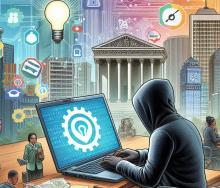As we rapidly hurtle towards the new year, it would be a shame not to acknowledge the absolute leaps and bounds made in technology over the course of 2022.
Spearheaded by sustainability, big data analysis needs, privacy concerns, connectivity, security considerations, and global communication needs, there has been undeniable advances in both hardware and software development throughout this year.

Even though there were limitations brought about by the global pandemic that slowed down many technological projects this year, there were still many innovative technologies that emerged in 2022. Companies in every corner of the globe have become more open-minded, adapting to the new normal and new ways of working while upgrading technologies to help manage outputs. This year also saw the unexpected switch to remote and hybrid working which also motivated some of the progress in the tech world.
RS South Africa too, adopted many new technologies and hybrid work models to ensure that little to no business disruption occurred and since the pandemic, the business has implemented and ready to implement new technologies to ensure that downtime is a thing of the past. In this ever-changing business environment, especially when many of RS’s customers rely on its ability to service them without any delays, being abreast of latest technological trends ensures that we are ready for most challenges.
The technologies that made 2022 great
5G technology adoption
According to Ericsson’s Mobility Report, published by Statista Research earlier this year, 5G technology subscriptions will surpass one billion this year. 5G has boosted the Internet of Things (IoT), which involves internet-powered smart devices linking and operating together. Unlike 4G, many devices can connect to the 5G network without a significant drop in speed, latency, and reliability. In South Africa, three out of country’s five major cellular operators have 5G networks and are rapidly growing their coverage.
Artificial intelligence (AI) and machine learning
Artificial intelligence is one of the most consistently evolving technologies in the world. Its potential to provide solutions across many industries, from health, security, and education to logistics and information technology with its most notable strength is its ability to analyse big data and providing reports that can be used by organisations to develop strategies and solutions. Other uses for AI include automation in manufacturing, guiding self-driving cars, operating as smart online assistants such as Siri or Google.
Clean technology (cleantech)
Clean technology has emerged as a response for the desire for sustainable living and this is influencing the development of new technologies known as clean technologies–or cleantech. Cleantech reduces the environmental impact of products or services while optimising the use of natural resources. Renewable energy has been the most notable attempt at developing sustainable technologies, with wind, hydroelectric, and solar power having a lower carbon footprint than fossil fuels. This is true for South Africa as many businesses and households have adopted alternative energy means as a response to the energy crisis. Currently, the top cleantech trends include rechargeable batteries, electric vehicles and motors, solar panel development, biofuel-powered turbo generators, and waste management technologies.
Educational technology (Edtech)
The COVID-19 pandemic forced school closures worldwide which impacted both the educational sectors and learners globally. Since the stabilisation following the pandemic, educational technology (edtech) companies have emerged to provide solutions by creating digital platforms for remote learning. Investments in the e-learning industry are increasing as start-ups form to innovate online education software and video conferencing technologies to give students access to teachers and courses. Furthermore, by integrating AI into the teaching platform, systems can personalise the coursework, track students’ learning styles, provides reports on their progress, and automates grading. In addition, AI simplifies the curriculum-creation process by reviewing the educational content available and highlighting what should be included in the lessons.
AI-powered cybersecurity
The steady increase in cyberattacks, email phishing scams, and ransomware is forcing cybersecurity firms to search for tech solutions to address the current issues. Criminal masterminds are hacking individuals’ accounts, countries’ critical infrastructure, and businesses of all sizes, causing millions, if not billions, in losses. Workplace digitisation and remote working in response to the COVID-19 virus made it a priority to retrain employees on online safety to reduce data breaches and losses.
Internet of Behaviours (IoB)
Perhaps one of the more controversial trends in tech over 2022 is IoB. A lot of customer and consumer data is collected by service providers through IoT devices in the home. Businesses are using analytics and big data techniques to determine the data’s value in what is now known as the Internet of Behaviours (IoB). By reviewing this customer information, businesses can personalise their services, market their products, and improve a customer’s experience with the company.
Brian Andrew, Managing Director at RS South Africa said that the COVID-19 pandemic has had a major impact on the evolution of technology over the past two years. “We at RS, have seen a major uptake in our IoT devices ranging from sensors and connected devices and what’s even more noteworthy is that these technologies are not only reserved for big business, but also households. We have also noticed that in SA, people and businesses have become more conscious and more aware than ever of the ever-evolving impacts of embracing tech at all levels,” he said.
Andrew also added that in 2022, we witnessed the many ways in which technology is improving healthcare and access to treatment, boosting e-commerce and digital payments, and enhancing online security. “Furthermore, protecting the environment and encouraging the use of sustainable technologies ensures the protection and awareness of protecting natural resources. Educational and collaborative technologies will continue to change how we learn and work, and AI may help to analyse the best way forward. At the same time, we must find a balance between innovating new technologies and regulating them to protect privacy and security,” he concluded.
With only two weeks left of 2022, one can be sure that the impacts of technological advancements will spearhead even more exciting tech in 2023.














